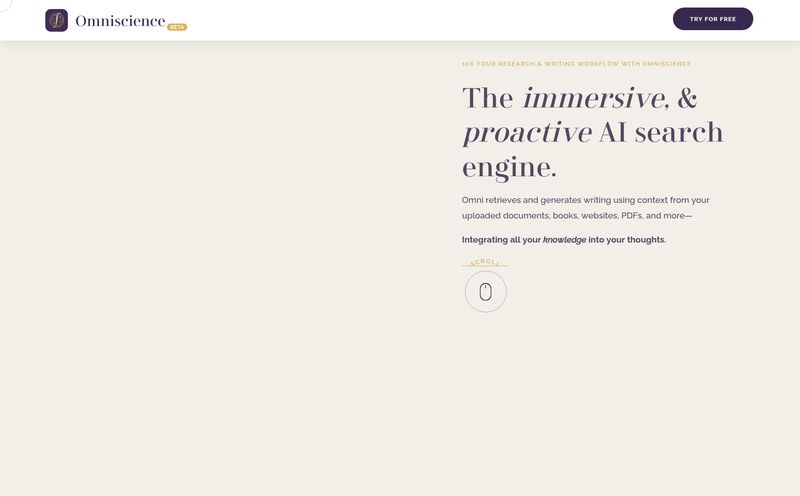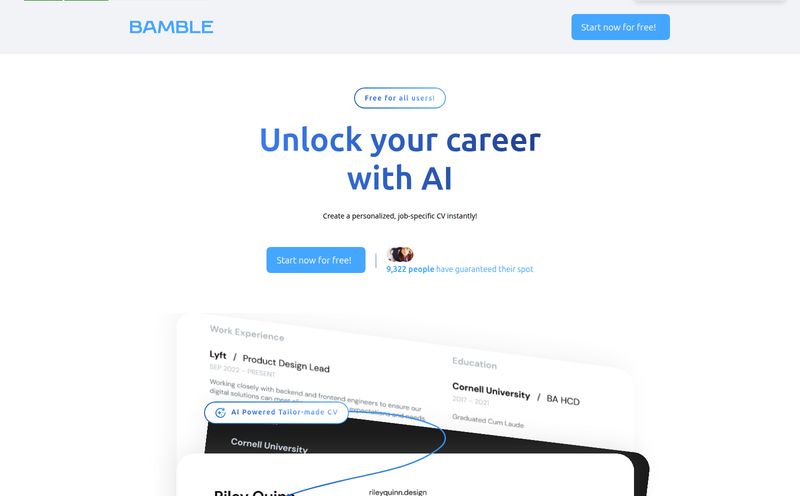As someone who’s been neck-deep in the SEO and content world for more years than I’d care to admit, I’ve seen my share of “game-changing” tools. Every week, it seems, a new app pops up promising to solve all our content woes. More traffic, less effort. The ultimate dream, right? So when a tool called RewriteIt.app crossed my desk, my curiosity was piqued. The promise was simple and seductive: harness AI to rewrite articles effortlessly while keeping the original meaning intact.
Sounds great. In a world where we’re all on a content treadmill, churning out posts, articles, and social updates, a reliable assistant that can help repurpose content without making it sound like a robot wrote it... well, that’s the holy grail. I was ready. I had a few old blog posts lined up, ready to be spun into gold. And then, I hit a snag. A rather large, digital snag.
First Contact with RewriteIt.app... or a Lack Thereof
I navigated to the website, coffee in hand, ready to put this thing through its paces. And I was greeted not by a slick user interface or a pricing page, but by a stark white screen with two lonely words: "Service Unavailable."

Visit RewriteIt.app
Huh. I refreshed. I tried a different browser. I cleared my cache, the digital equivalent of blowing on an old Nintendo cartridge. Nothing. The digital doors were shut, with no note explaining why. Is it a temporary glitch? A server taking a nap? Or has RewriteIt.app become a ghost ship, an abandoned project floating in the vast, crowded ocean of AI startups? Honestly, in this gold rush era of AI, it could be anything.
But this little mystery doesn't mean we cant talk about it. The promise of tools like RewriteIt.app is still worth dissecting, because they represent a major fork in the road for content creators.
The Seductive Promise of AI Article Rewriters
Let's ignore the error page for a moment and focus on the concept. RewriteIt.app claims it can transform articles while “retaining their essence and accuracy.” This isn't your grandma's article spinner from 2010 that would just swap out words with clunky synonyms, leaving you with nonsense like "The canine leaped over the sluggish maroon fox." No, modern AI paraphrasers aim for something much more sophisticated.
So What Was It Supposed to Do?
Based on the whispers and the minimal data available, the core function was straightforward: you feed it a piece of text, and it gives you a new version. The potential use cases are pretty obvious for anyone on the content grind:
- Refreshing Old Content: Got a great post from three years ago? A rewriter could give it a fresh coat of paint to republish without it being a straight duplicate.
- Repurposing Across Platforms: You could, in theory, take a dense blog post and ask the tool to generate a more concise version for an email newsletter or a punchy thread for X (formerly Twitter).
- Avoiding Plagiarism: For researchers or students (let's be honest), it's a way to rephrase source material into their own words. Though this one walks a fine ethical line.
The goal is efficiency. It’s about doing more with what you already have. But there's a dark side to this shiny coin, and its name is Google.
The AI Rewriter vs. Google's Helpful Content Police
I've seen so many sites get absolutely hammered by Google updates, and a lot of the time it comes down to one thing: originality and value. This is where the dream of effortless content can quickly become a nightmare.
Google's own documentation on AI-generated content and their repeated Helpful Content Updates have made one thing crystal clear: they dont care if a human, a robot, or a highly-trained capuchin monkey wrote your content. They care if it's helpful, reliable, and demonstrates experience and expertise.
Using automation—including AI—to generate content with the primary purpose of manipulating search rankings is a violation of our spam policies.- Google Search Central
Rewriting an article without adding any new insight, new data, or a unique perspective is the definition of unhelpful content. It's just shuffling words. It's like taking a photograph of a Rembrandt painting and calling yourself an artist. You’ve captured the image, sure, but where is the value? Where is the you?
A poorly used rewriter is a one-way ticket to creating thin, derivative content that will either get ignored by Google or, worse, get your entire site penalized. I’ve seen it happen, and it aint pretty.
Pricing and Features: The Missing Pieces
So, what would RewriteIt.app have cost? Your guess is as good as mine. There was no pricing page to be found, no hint of a free trial or a subscription model. This lack of transparency is a huge red flag for any service, even when it's actually online.
As for features, the only one listed was “AI-powered article rewriting.” That's it. No mention of language support, tone adjustments, different rewriting modes (like 'formal,' 'creative,' 'concise'), or integration with other platforms. It's like a car dealership just saying their car has an “engine.” Okay, great... but can you tell me a little more?
This lack of detail, combined with the dead website, paints a picture of a project that was perhaps launched in a hurry to catch the AI wave, but without the foundation to stay afloat.
So, Should You Use an AI Rewriter? (The Real Question)
Even if RewriteIt.app comes back online, the bigger question remains: should you even use a tool like this? My answer is a firm... maybe. It’s not the tool; it's how you use it.
Think of an AI rewriter as an intern. A very fast, slightly weird intern who has read the entire internet but doesn't have any life experience. You wouldn't let your intern publish a blog post without you reviewing it, editing it, and adding your own expert opinion, would you? Of course not.
Use it as a brainstorming partner. Use it to overcome writer's block. Use it to get a first draft. But never, ever just copy, paste, and publish. That’s not content strategy; that’s content malpractice. You must be the final filter, the human touch that adds the stories, the analogies, the personal frustrations, and the unique insights that no AI can replicate.
Frequently Asked Questions (FAQ)
- 1. What is RewriteIt.app?
- RewriteIt.app is (or was) a web-based tool that claimed to use artificial intelligence to rewrite articles and other text while preserving the original meaning. Its main goal was to help users create new versions of existing content effortlessly.
- 2. Is RewriteIt.app free to use?
- There is no available information on its pricing. At the time of this review, the website is inaccessible, so details about any free plans or subscription costs are unknown.
- 3. Can using an AI rewriter hurt my SEO?
- Yes, it absolutely can if used improperly. Simply rewriting content without adding significant new value, insights, or expertise can result in what Google considers “unhelpful content.” This can lead to poor search rankings or even a manual penalty. Always focus on creating content that is original and valuable to the reader.
- 4. What are some good alternatives to RewriteIt.app?
- There are many established AI writing and paraphrasing tools on the market. Some of the most popular and well-regarded ones include QuillBot, Jasper (formerly Jarvis), and Copy.ai. Each has its own strengths, so it's best to try a few to see which fits your workflow.
- 5. Why is the RewriteIt.app website down?
- It's impossible to say for certain. It could be temporary technical maintenance, a server issue, or the project may have been discontinued. This is a common risk with new, unestablished software tools.
A Final Thought on Digital Ghosts
The story of RewriteIt.app, whether it’s a temporary blip or a final chapter, is a perfect little parable for the current state of AI. There’s a frantic rush, with new tools appearing and disappearing overnight. Some will become indispensable parts of our workflow. Many others will end up as digital ghosts, their landing pages showing nothing but an error message.
My quest to review RewriteIt.app ended not with a conclusion, but with a question mark. And maybe that's the best takeaway. In this rapidly changing field, we need to approach new tools with a healthy dose of curiosity and an even healthier dose of skepticism. The best tool you will ever have, after all, is the one between your ears.
Reference and Sources
- Google Search Central Documentation on AI-Generated Content: https://developers.google.com/search/docs/specialty/generative-ai
- A popular alternative, QuillBot: https://quillbot.com/



